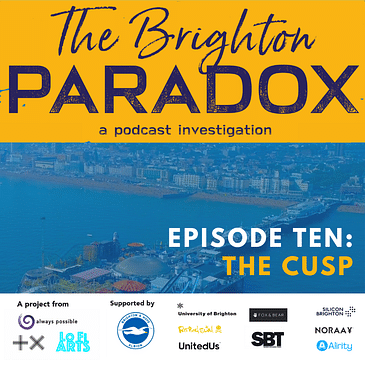- Keeping Brighton weird? The city as the UK's laboratory and how to grow that philosophy
- Paying it forward? Making space for young people to shape, lead and disrupt
- Fixing the ecosystem? Being brave to make long-term change to the city’s infrastructure
- Community power? Harnessing the energy of everyone, everywhere to shape the future
- Fiona Anderson (plusx.space)
- Declan Cassidy (https://intogames.org/)
- Samantha Harland (plusx.space)
- Norman Cook (https://www.fatboyslim.net/)
- Sarah Ticho (https://hatsumi.co.uk/)
- Adam Muirhead (https://www.trustdevcom.org.uk/)
- Andy Budd (https://www.andybudd.com/)
- John Varah (https://samesky.co.uk/)
- Donna Close (https://uk.linkedin.com/in/donnaclose)
- Loubna Khamlichi (https://noraay.com/)
- Boogaloo Stu (https://www.instagram.com/boogaloostu/)
- Angi Mariani (https://thelatest.co.uk/)
- Adam Joolia (https://audioactive.org.uk/)
- Rachel Carter (https://futurecreators.org.uk/)
- Jack Maddalena (https://www.naurt.com/)
- Kelly Dibbert (https://uk.linkedin.com/in/kelly-dibbert-33821818)
- Claire Mason (https://www.manbitesdog.com/)
- Pam Loch (https://lochassociates.co.uk/)
- Caroline Lucas MP (https://www.carolinelucas.com/)
- Kelvin Newman (https://brightonseo.com/)
- Dr Adam Jones (https://www.brighton.ac.uk/business-services/help-to-grow.aspx)
- Jeannie Boyle (https://eqinvestors.co.uk/individuals/team/jeannieb)
- Andy Winter (https://andywinterbn1.wordpress.com/)
- Tom Druitt (https://thebiglemon.com/)
- Luke Taylor (https://unitedus.co.uk/)
- Kevin Grist (https://www.electricmedway.org/)
- Ruth Anslow (https://hisbe.co.uk/)
- Carolynn Bain (https://afroribooks.co.uk/)
- Barry Joinson (https://barryjoinson.com/)
- Naomi Alexander (https://brightonpeoplestheatre.org/)
- Jenni Lloyd (https://twitter.com/jennilloyd)
- Kathy Caton (https://brightongin.com/)






